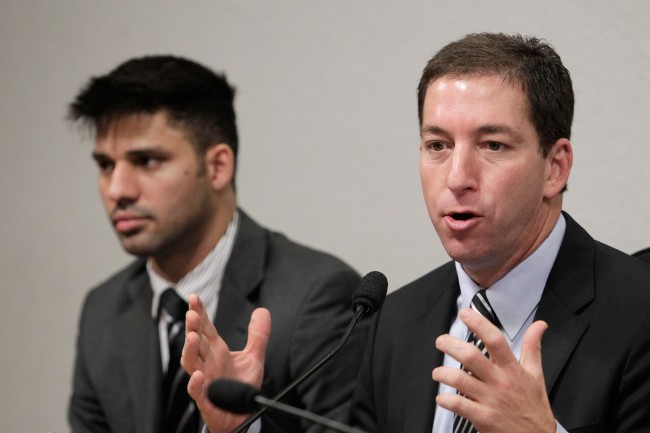Edward Snowden, Glenn Greenwald and Ron Paul use the The Guardian to change the world, and other views on leaking
 WHAT do we make of the Guardian’s decision to publish Edward Snowden’s leaks?
WHAT do we make of the Guardian’s decision to publish Edward Snowden’s leaks?
MI5 chief Andrew Parker: “The gift to evade us and strike at will'”
David Aaronovitch in the Times:
The new head of MI5 was never going to praise leakers. So Andrew Parker, in his first speech, talked of the “enormous damage” caused by making public the extent and limitations of the reach and techniques of GCHQ. But he didn’t specify what the damage was and so, once again, you either took it on trust or you didn’t take it at all…we should be clear that some of the information procured by first Bradley (now Chelsea) Manning and that Edward Snowden passed on was indeed damaging to Western security. As Rusbridger told me: “Of the material we’ve seen, we haven’t published much of it, and there’s some stuff that in my judgment should remain secret.” When I asked why, he replied: “Because it would endanger individual people or it’s about operations that are rightfully properly secret.”
But even if you trust his security judgment, Rusbridger is not the only actor. On August 18 the Brazilian boyfriend of the Guardian-linked US journalist Glenn Greenwald was detained at Heathrow. This act was represented by Greenwald as an act of spite and intimidation. But the security services told a court that, on examination, Miranda’s computer was carrying 58,000 secret documents relating to GCHQ. Presumably he was taking them, via intermediaries, from Snowden in Moscow to Greenwald in Rio.The link between Snowden and Greenwald is fascinating and reveals something important about the new politics of the internet era — starting with what the fugitive Snowden said at Moscow airport about his political views. He replied to a questioner that he was “a libertarian”. On investigation it turned out this was indeed true and that he had given money to the radical libertarian campaign for the presidency in 2012 of a man called Ron Paul…
Traditionally a man such as Paul would have had few friends on the left. He is anti-abortion, anti-immigration and has a history of links with some fairly dodgy views on race. Yet in 2011 we find Greenwald recommending Paul to the readers of a left-wing online magazine. Paul was, he said, “the only major presidential candidate” to say the right things on the questions that really mattered…
When Paul started up a TV show in the spring, Greenwald was his first guest, described as “the most important journalist in the world today”. Paul’s enemies are Greenwald’s enemies are Snowden’s enemies.
What I’m describing here is not a conspiracy but an affinity. And, I think, quite an extreme political affinity. And though Rusbridger may be a “proper” journalist (and he certainly is), someone like Greenwald is first and foremost an activist. He wants above all to change the world, not just to report it…
Daily Mail described the Guardian in a headline: ‘The paper that helps Britain’s enemies'”
The Guardian: “The Mail’s leading article must be read in the context of a fervent discussion about press regulation in which it is leading the charge for journalists to be both free and trusted. But yesterday’s editorial argues the opposite. It is a statement of anti-journalism: editors, it says, cannot be trusted. They must defer to the state.”
Guardian editor Alan Rusbridger: “You would have to be a terrorist who didn’t know how to tie his shoelaces not to believe that people were watching things on the internet and scooping up telephone calls. I don’t think some of this will come as a great surprise to terrorists.”
Stephen Glover in the Mail: “I don’t accuse Mr Rusbridger of any lack of patriotism. I am sure he loves his country as much as anyone. But he does stand accused of the most stupendous arrogance and presumption.”
Daily Telegraph in a leader: “This is the first time it has been proposed that an industry should be forced to sign up to a Royal Charter rather than voluntarily accede to one. Moreover, the cross-party charter – cobbled together without any discussion with the industry – would be underpinned by legislation, thereby giving it the very statutory basis that David Cameron rightly said would be ‘crossing the Rubicon’. For all their protestations to the contrary, our politicians are proposing to bring back statutory press control for the first time in more than 300 years. This is unacceptable.”
Rupert Murdoch @rupertmurdoch on Twitter: “BBC massive taxpayer funded mouthpiece for tiny circulation leftist Guardian. Meanwhile print media about to be gagged to protect toffs.”
The Telegraph:
“Sources find it incomprehensible that exposing spy agency techniques for tracking terrorists has been argued to be in the public interest… and it is understood the Guardian continued to expose the information despite pleas from the Government not to reveal intelligence techniques.”
The Telegraph editorial earlier that week:
“A free press is one that is free from government or political interference… For all their protestations to the contrary, our politicians are proposing to bring back statutory press control for the first time in more than 300 years. This is unacceptable.”
Fraser Nelson in the Telegraph: “Mr Grayling’s Bill of Rights should incorporate a clause about freedom of speech and the press, ideally giving Britons the same protection as afforded to Americans by their First Amendment to the Constitution. It would help judges such as Lord Justice Leveson to understand the importance and definition of a free press. It would help politicians see that the Leveson proposals would, in the words of the New York Times, ‘chill free speech and threaten the survival of small publishers and internet sites’. And it would, moreover, put temptation out of Mr Miliband’s way.”
Posted: 11th, October 2013 | In: Reviews Comment | TrackBack | Permalink



